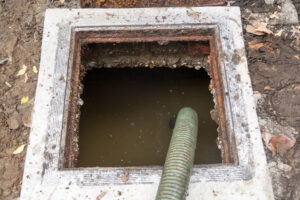
Years ago, it was common to leave septic tanks in place and forget about them. If you’ve recently bought an older home, there might be a septic tank on the property. At some point in the past, a previous owner may have abandoned the old septic system and connected it to the city sewer when it became available.
An old septic tank on your land is a huge safety risk, especially if you have kids, pets, or livestock.
Here are a few reasons why an abandoned septic system is dangerous and should be removed as quickly as possible.
Sinkhole Collapse
Nowadays, septic tanks are concrete or plastic, but they were made of steel years ago. These steel tanks left underground for long periods, exposed to water, will rot, rust, weaken and corrode away. If a rotten septic tank lid gives way, it can cause a sinkhole to form, creating a dangerous situation. The weight of a structure, vehicle, or even a person can be enough to bring the whole thing down, potentially severely injuring or trapping anyone on the surface.
Deadly Sewage
Old septic tanks can contain old sewage, which produces deadly methane gas. If you are exposed to this gas inside the tank, it could suffocate you or a loved one very quickly. The typical lifespan for a steel septic tank is about 25 years. If yours has been in the ground this long, you can be sure that it is beginning to rot away.
Floating
These old tanks may float to the surface during heavy rains or flooding without proper anchoring. Even correctly secured tanks may break loose after a long enough period of abandonment. Floating tanks can cause contamination or property damage.
Old, abandoned septic tanks are hazardous and need to be taken care of immediately. If you have an old tank on your property, you will need to bring in a professional septic tank service company that is equipped to remove abandoned tanks. Call (410)795-2947 to contact a knowledgeable septic tank service company and take care of potential septic issues before winter sets in.

Thank you for info. There are two septic tanks on this property, how do I find the old one? Also what about old ditch tunnels/pipes dangerous? Find them?